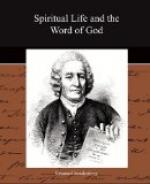All in the heavens have places allotted them according to the fullness and clearness of their idea of the Lord, and they are in correspondent wisdom and in correspondent felicity. All those who have no idea of the Lord as Divine, like the Socinians and Arians, are under the heavens, and are unhappy. Those who have a twofold idea, namely, of an invisible God and of a visible God in a human form, also have their place under the heavens, and are not received until they acknowledge one God, and Him visible. Some in the place of a visible God see as it were something aerial, and this because God is called a spirit. If this idea is not changed in them into the idea of a Man, thus of the Lord, they are not accepted. But those who have an idea of God as the inmost of nature are rejected, because they cannot help falling into the idea of nature as being God. All nations that have believed in one God, and have had an idea of Him as a Man, are received by the Lord. From all this it can be seen who those are that worship God Himself and who those are that worship other gods, thus who live according to the first commandment of the Decalogue and who do not. (A.E., n. 957.)
II. The Second Commandment
The second commandment is, “Thou shalt not profane the name of God.”
In the first place, what is meant by “the name of God” shall be told, and afterward what is meant by “profaning” it. “The name of God” means every quality by which God is worshipped. For God is in His own quality, and is His own quality. His essence is Divine love, and His quality is Divine truth therefrom united with Divine good; thus with us on earth it is the Word; consequently it is said in John:
“The Word was with God, and the Word was God” (i. 1).
So, too, it is the doctrine of genuine truth and good from the Word; for worship is according to that.
Now as His quality is manifold, for it comprises all things that are from Him, so He has many names; and each name involves and expresses His quality in general and in particular. He is called “Jehovah,” “Jehovah of Hosts,” “Lord,” “Lord Jehovah,” “God,” “Messiah (or Christ),” “Jesus,” “Saviour,” “Redeemer,” “Creator,” “Former,” “Maker,” “King,” and “the Holy One of Israel,” “the Rock” and “the Stone of Israel,” “Shiloh,” “Almighty,” “David,” “Prophet,” “Son of God,” and “Son of Man,” and so on. All these names are names of the one God, who is the Lord; and yet where they occur in the Word they signify some universal Divine attribute or quality distinct from other Divine attributes or qualities. So, too, where He is called “Father, Son, and Holy Spirit,” three are not meant, but one God; that is, there are not three Divines, but one; and this trine which is one is the Lord.




